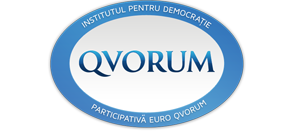Argument
The European Parliament’s decision of October 9 2008, concerning the approval of the common declaration regarding the Partnership for Communication in Europe, Leinen Report, stipulates: “communication represents an important element of both representative and participatory democracy” and that “the experience gained in the past European elections and referenda suggests that there is a higher probability of participation by informed people interested in EU affairs, while participation of poorly informed and less interested people is lower”.
The Institute for Participative Democracy – Euro Qvorum is a non-governmental organization, founded in 2008 by a group of young specialists, its purpose being to stimulate active citizenship and participation of social and economic partners in the European and national decision-making process. In this regard, Qvorum is developing projects which aim to improve the dialogue between political decision-makers and society by structuring and raising it to a professional level.
Qvorum Team’s Vision is imagining Romania as being powerful and cohesive, connected to the European decision-making process and values and being itself capable of influencing these values and legislative norms. We consider that Romania, the 7th largest country from all 28 countries members of European Union, has potential and must play an important role in helping post-crisis Europe, a desirable aspect which can be achieved only by specializing the new generations of national and regional leaders from administrative, economical, civic and political areas.
Qvorum Institute’s Mission is to support the activity of public and private institutions and also political parties by strengthening and disseminating expertise through advanced training programs, seminars, research and applied consulting.
Qvorum considers that in order to assure economic, political and social modernization of the country, Romania needs political stability and legislative predictability, objectives which can be accomplished only through a continuous dialogue between citizens and representatives, being held in a mutual trustworthy environment. In this regard, our team is combining two directions of complementary actions:
a) From institutions towards society: encouraging a greater openness from the public institutions’ side in order to create political opportunities to as many social and economic segments for involving themselves in the decision-making process;
b) From society towards institutions: raising economic-social partners and citizens’ level of culture, in order to easily identify their interests and to become credible and legit interlocutors for decision-makers.
The team of The Institute for Participative Democracy – Euro Qvorum has young professional members from the civil society, academic environment, political environment and mass media. Qvorum has support from reputed personalities across Romania and from abroad and its activity takes place in Brussels, Bucharest, Cluj Napoca and other cities within the country. Designed as a dynamic platform, The Qvorum Institute reunited around itself a network of experts, researchers and students from the field of social sciences interested in European affairs and participative democracy. If you want to join our network, contact us at [email protected].
Executive Team:
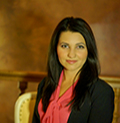 Iulia Popescu, Programmes Director at Qvorum, is an expert in how public administration is operating and she has a remarkable experience in European affairs. She is coordinating, creating and implementing the strategies of Qvorum’s training programmes. During her career in the NGO sector, Iulia Popescu has developed an interest in the social entrepreneurship, management and counseling regarding financing the non-governmental sector. She graduated from the Faculty of Public Administration and the European Public Space Master Programme from National School of Political Science and Public Administration.
Iulia Popescu, Programmes Director at Qvorum, is an expert in how public administration is operating and she has a remarkable experience in European affairs. She is coordinating, creating and implementing the strategies of Qvorum’s training programmes. During her career in the NGO sector, Iulia Popescu has developed an interest in the social entrepreneurship, management and counseling regarding financing the non-governmental sector. She graduated from the Faculty of Public Administration and the European Public Space Master Programme from National School of Political Science and Public Administration.
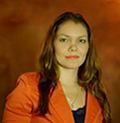 Rucsandra Filloreanu, Programmes Manager at Qvorum. Her areas of expertise are the coordination of projects with European funding in the field of public participation on European and national level. She took part in writing several studies regarding monitoring the activity within the European Parliament and European institutions functioning mechanisms. For many years, Rucsandra Filloreanu has been involved in Qvorum training programmes, holding training sessions on topics such as national and European institutional affairs. Rucsandra graduated from the Faculty of Political Sciences and two Master programmes – Gender and minority policies and Communication and Public Relation from NSPSPA.
Rucsandra Filloreanu, Programmes Manager at Qvorum. Her areas of expertise are the coordination of projects with European funding in the field of public participation on European and national level. She took part in writing several studies regarding monitoring the activity within the European Parliament and European institutions functioning mechanisms. For many years, Rucsandra Filloreanu has been involved in Qvorum training programmes, holding training sessions on topics such as national and European institutional affairs. Rucsandra graduated from the Faculty of Political Sciences and two Master programmes – Gender and minority policies and Communication and Public Relation from NSPSPA.
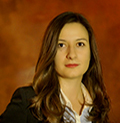 Gabriela Sincă, Programmes Assistant at Qvorum, has experience in implementing projects with irredeemable funding (POSDRU, PODCA, Grundtvig and Leonardo da Vinci). Inside the Qvorum team she is actively participating with creating series of reports and monitoring regarding the legislative and executive activity. Gabriela is licensed in Engineering and Management at The Polytechnic University from Bucharest and she graduated from the same college, a master programme in Industrial Entrepreneurship.
Gabriela Sincă, Programmes Assistant at Qvorum, has experience in implementing projects with irredeemable funding (POSDRU, PODCA, Grundtvig and Leonardo da Vinci). Inside the Qvorum team she is actively participating with creating series of reports and monitoring regarding the legislative and executive activity. Gabriela is licensed in Engineering and Management at The Polytechnic University from Bucharest and she graduated from the same college, a master programme in Industrial Entrepreneurship.
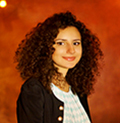 Teodora Petrescu is the newest member in the Qvorum team. She graduated from the Faculty of Communication and Public Relations from NSPSPA, and she is currently studying at the Master of Training of Trainers from University of Bucharest. Being passionate about nonformal education, art and philosophy, Teodora wishes that, in the near future, she may have the opportunity to combine all of these three domains and become specialized in everything related to experiential learning. Within the organization, she is responsible with promoting the activity and the projects of Qvoru.. Besides creating communication and visual materials, she is also maintaining the connection with members from the Qvorum community, furthermore promoting the mission and vision of the organization.
Teodora Petrescu is the newest member in the Qvorum team. She graduated from the Faculty of Communication and Public Relations from NSPSPA, and she is currently studying at the Master of Training of Trainers from University of Bucharest. Being passionate about nonformal education, art and philosophy, Teodora wishes that, in the near future, she may have the opportunity to combine all of these three domains and become specialized in everything related to experiential learning. Within the organization, she is responsible with promoting the activity and the projects of Qvoru.. Besides creating communication and visual materials, she is also maintaining the connection with members from the Qvorum community, furthermore promoting the mission and vision of the organization.
Experts:
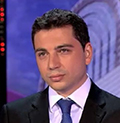 Doru Franţescu is an expert in how European institutes are operating and he is currently working in Brussels. His international career is involving European legislation analysis within the organization VoteWatch Europe from Belgium and Great Britain (being also co-founder). Complementary, he leads training sessions in Romania and other countries and he has frequent interventions in the european mass media. His academic training includes superior and master studies in political science, journalism and communication. He speaks fluently English, French, Spanish and Italian.
Doru Franţescu is an expert in how European institutes are operating and he is currently working in Brussels. His international career is involving European legislation analysis within the organization VoteWatch Europe from Belgium and Great Britain (being also co-founder). Complementary, he leads training sessions in Romania and other countries and he has frequent interventions in the european mass media. His academic training includes superior and master studies in political science, journalism and communication. He speaks fluently English, French, Spanish and Italian.
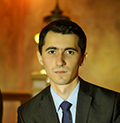 Adrian Lucian Kanovici is assistant professor within the Academy of Economic Studies from Bucharest and also a trainer in the field of local and central public administration functioning. He graduated from the Master of Geopolitics and International Relations (ASE Bucharest) and is currently a doctor in Geography (University of Bucharest). During his career in the academic environment and in the NGO sector, Adrian Kanovici became interested in geopolitics of West Balkans and international organizations functioning mechanisms. In the last ten years he was active in the press, civil society and academic environment.
Adrian Lucian Kanovici is assistant professor within the Academy of Economic Studies from Bucharest and also a trainer in the field of local and central public administration functioning. He graduated from the Master of Geopolitics and International Relations (ASE Bucharest) and is currently a doctor in Geography (University of Bucharest). During his career in the academic environment and in the NGO sector, Adrian Kanovici became interested in geopolitics of West Balkans and international organizations functioning mechanisms. In the last ten years he was active in the press, civil society and academic environment.
